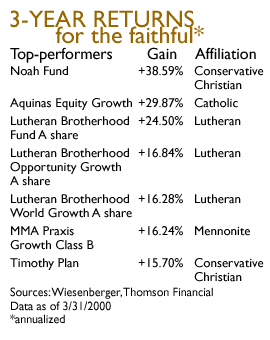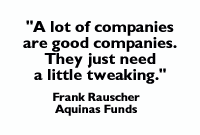|
Go with God and Cisco
|
 |
April 21, 2000: 7:52 a.m. ET
Faith-based funds yield some solid, sin-free returns -- or close to it
By Staff Writer Jeanne Sahadi
|
NEW YORK (CNNfn) - It is a holy week for many religious people worldwide, and many are now able to practice their faith not only in houses of worship but also on Wall Street.
That's because they can invest in a small but growing number of retail mutual funds targeted to their particular denomination. These funds, more often than not, invest only in companies whose products do not violate the core values of religious faith.
 That usually means ruling out the world's Playboys and cigarette makers, but, thankfully for the investors' wallets, not the Cisco Systems and Microsofts. As a result, the returns don't necessarily suffer. That usually means ruling out the world's Playboys and cigarette makers, but, thankfully for the investors' wallets, not the Cisco Systems and Microsofts. As a result, the returns don't necessarily suffer.
Take the Noah Fund, a conservative Christian, large-cap growth fund with a heavy weighting in technology. It shuns tobacco, alcohol beverage, pornography, gambling and abortion-related stocks.
Noah delivered the best 3-year annualized return -- 38.6 percent -- of faith-based retail funds. And compared to its secular peers in the same category, its 3-year return ranked it in the top 17 percent, according to fund-tracker Wiesenberger, a division of Thomson Financial.
"That's not bad at all," said Wiesenberger analyst Ramy Shaalan.
Screening with a twist
The fact that the Noah Fund screens its investments is one of the ways it is similar to many other Christian-based funds, which make up the majority of faith-oriented investment vehicles in the United States. (One Islamic fund family exists at present, and no retail funds that invest according to principles of Judaism.)
But not all funds apply the same screens. For instance, MMA Praxis, a Mennonite family of funds, bans investment in top defense-related industries as well as alcohol, tobacco and gambling.
 Screens are usually not absolute. MMA Praxis may not buy Lockheed Martin, but it won't divest its holdings in a computer company if it sells desktop PCs to the Pentagon. Screens are usually not absolute. MMA Praxis may not buy Lockheed Martin, but it won't divest its holdings in a computer company if it sells desktop PCs to the Pentagon.
"We don't propose to say our funds are pure," said Mark Regier, MMA Praxis' coordinator for socially responsible investing research. "(Purity) doesn't exist in the corporate world."
Noah Fund President William L. Van Alen, Jr. agreed. "We're all sinners. If you're going to exclude sinners, then you're going to exclude everything," he said, explaining why fund manager John J. Geewax is not allowed to invest in an abortion pill maker but is permitted to invest in the stores that sell it.
Acting up
Solid returns in religious funds are sometimes countered by higher-than-average expenses and risk ratings. And if you want true diversity in your portfolio, experts say you may need to look outside the faith for some of your investments.
But one of the perks for investors who take their religious beliefs seriously is a fund's commitment to a greater social good, and a fund more in keeping with the faith's values.
The Christian Brothers Investment Services, which runs commingled funds for many Catholic organizations and whose most popular funds have returned about 28 percent on average for the past three years, states "that both investment returns and social returns are legitimate ends to pursue through the voting process."
Changing policy
Those social returns are usually pursued in concert with other religious funds under the guidance of the Interfaith Center on Corporate Responsibility, which coordinates 275 religious institutions that manage over $100 billion in assets. Investors lobby companies both directly and through shareholder resolutions.
Sometimes these efforts focus on issues common to many socially responsible investors -- such as environmental damage or unfair labor practices -- but the funds are just as likely to lobby a paper company to discontinue its work for a cigarette maker.
Appealing to the bottom line
But raising objections based on social or moral concerns alone is not always the most effective path to corporate change. That's why Frank Rauscher, president of the Catholic-run Aquinas Funds, prefers a more bottom-line approach.
No company has ever changed its policy because a mutual fund refused to invest in it, he said. And if you're not invested, it makes it harder to have a dialogue.
"A lot of companies are good companies. They just need a little tweaking," Rauscher said.
 That's why Aquinas applies its screens -- for abortion, contraception, gender discrimination, race discrimination and affordable housing -- after it buys a stock. In fact, Aquinas will invest in anything except Playboy Enterprises. "We just couldn't figure out a strategy to change the business," Rauscher said. That's why Aquinas applies its screens -- for abortion, contraception, gender discrimination, race discrimination and affordable housing -- after it buys a stock. In fact, Aquinas will invest in anything except Playboy Enterprises. "We just couldn't figure out a strategy to change the business," Rauscher said.
But it can apply pressure based on its screens to effect change. Take gender discrimination. Rather than argue that more women should sit on corporate boards, Rauscher believes more executives will perk up if they are told having no women on a board makes the company vulnerable to a lawsuit.
"That's money out of shareholders' pockets," he said. "We want the CEO to be a winner in the decision. We don't try to provide a moral argument."
But they do try to provide returns. One of its top holdings, the midcap Aquinas Equity Growth Fund, delivered a three-year annualized return of nearly 30 percent, making it the No. 2 faith-based fund for the period. But relative to its secular peers, it only ranked in the 40th percentile, according to Wiesenberger.
Competing with the mainstream
Such comparisons to secular investment strategies are taken seriously by the faithful. And they are eager to deliver competitive returns.
The Lutheran Brotherhood, which controls nearly $27 billion in assets that include 11 mutual funds and a host of other financial products, is a good example.
The organization does not consider itself a faith-based or socially responsible investment service. Nevertheless, it is open only to Lutherans and will not invest in alcohol, tobacco or gambling. The first two are banned because they contribute to poor health, representatives said. But the latter, they concede, is off-limits for both financial and religious reasons. Gaming represents a squandering of resources, and like other Christian-based funds, the Lutherans take seriously the stewardship of God's resources -- in this case, money.
Not that the screens have dampened the Lutheran funds' prospects. The Lutheran Brotherhood Fund, for instance, gained 24.5 percent on average over the past three years, putting it in the top quarter of all growth and income funds, Wiesenberger said.
But even those that haven't performed as well -- like MMA Praxis' Growth Fund, which ranked in the 78th percentile of large-cap growth funds - know the pressure is on to produce.
As Regier said, "We don't run a do-gooder fund. We operate in a very competitive environment." 
|
|
|
|
|
 |

|

